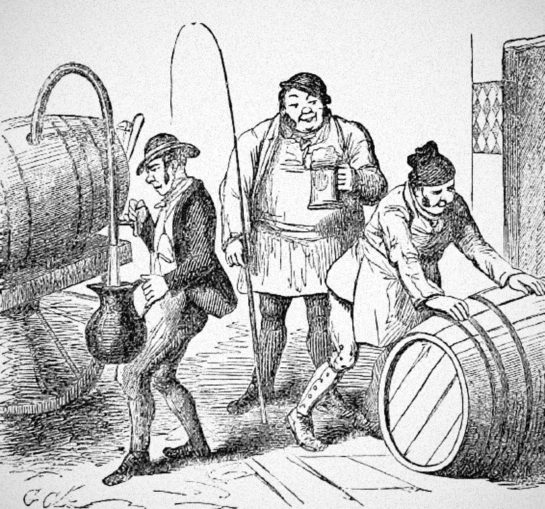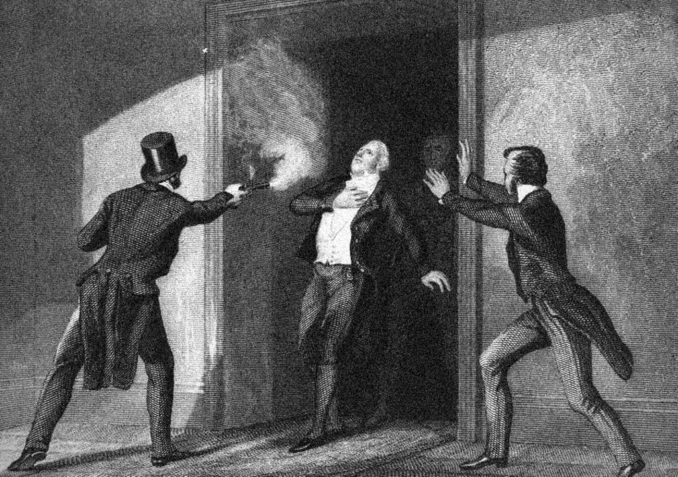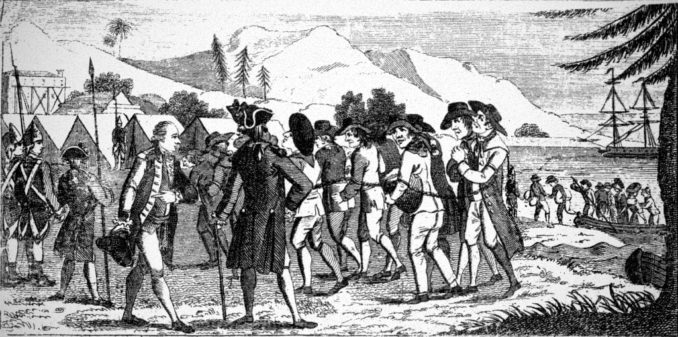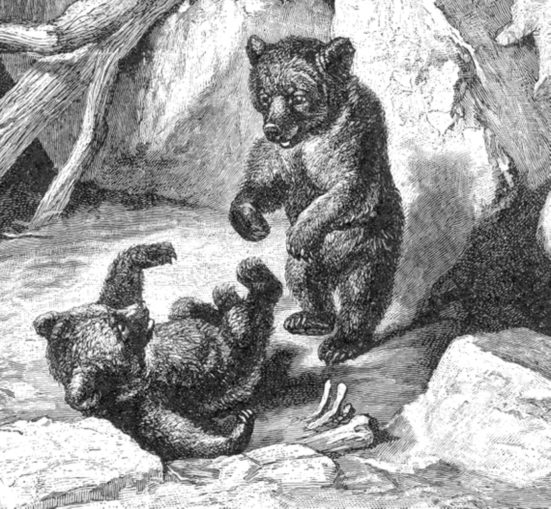September 3rd, 1811.
I have been too much occupied to keep up my diary for several months. We have all been toiling on the improvement of the Bear Inn, which had fallen into some disrepair since Cornelius had been widowed. But now the rooms are newly painted and furnished and spotlessly clean, and should Royalty chance to honour us with their presence, they would not find fault in our accommodation.
By the way, on our return we discovered that our good King George’s madness has been pronounced to be incurable, sad to hear for he was a true lover of his country and a patron of the sciences and agriculture. The Prince of Wales, de facto regent for some years, has now been officially confirmed in that position by an Act of Parliament.
But enough of these mundane topics, for my true reason for taking up my pen again is that both Angelina and Emily have been safely delivered of cubs within three days of each other. Both are male. Angelina and Bruin have named theirs Arthur, after Viscount Wellington at whose side they fought in Spain and Portugal. Peter and Emily have called their cub Frederick, of course after our dear Fred who has guided us so well in our adventures, and who has stood as godfather to both cubs.
And I am a grandmother! It is such a joy to hold my dearest little grandbear. I cannot truthfully say that he resembles either of his parents, for newborn bear cubs do not look much like anything except what they are, which is delightful in its own way. The same might be said of human infants, but humans are prone to sentimental delusions and will swear that their offspring are the image of their father or mother.
I am gaining skill as a brewer and have already devised an ale much to my taste and that of the other bears, dark with roasted barley and considerably stronger than the usual brew. We sell it as Brown Bear Ale, but its nickname among the human patrons is Old Staggers.

Although our customers often become merry, there is little fighting in our inn. People have learnt that if they become unruly, a bear will throw them out with a force that carries them across the street and into a patch of nettles on the other side.
December 26th, 1811.
Our first Christmas in Wiveliscombe has been a joyous occasion, with feasting and rejoicing in the true old English style. In the morning we attended the service at the ancient and tumbledown church of St Andrew, where there is no longer any surprise at seeing bears among the congregation, and Fred and Jem often assist the musicians. We closed the inn for the day, for everyone who has a home would be there with the family, but we remembered the unfortunate inhabitants of the workhouse and brought them in for a good dinner.
We drank the health our noble patron Count Bagarov with particular affection, for on Christmas Eve we had received a letter from him, replying to the letter we had sent him in July thanking him for his generosity on our long voyage. It takes a long while for letters to arrive in Archangel, and to return from there. We had politely written our letter in passable Russian, penned by my own paw. He returned the courtesy by writing to us in English of a sort, as follows.
My deer Fred Djem Doloris Daisy an all the barez,
I carnt tell yu ow delited I wer to reseave yur letter. Pleez du not thank me for the muny i giv yer, wich wer no mor than wot yu all diservd for yur loyl companyunship on our long voyidj. No dowt yu will be plesd to ear that Boris Beaivi an Marina are all in gud spiritz an they send gretinz an luv to yu all. I ope yur new cubz is doin well.
We reechd Arkhangelsk in gud order and sadly i sold our ole ship wot as carried us so far tho i wer pleezd to mayk a profit on the sayl. I also got a lot o wedj from the cargow of spicez an all thoz fingz wot we braut bak. I never thaut this voyidj wud be profitabl but it az bin. May other Russianz profit by our eksampl!
But ive ad an ard time convinsin peepl that we reely went thru the Norf Eestern Pasidj.Wen I last gon to Sankt Peterburg all the boyarz at the cort larfed at me. I giv the Tsar a Chineez ivery carvin wot I bort in Canton – one o them ball fingz full ov olez wiv anuver ball rattlin arand inside it an anuver ball in that an so on. Iz Madjisti was very perlite – eez a darmond geezer – but even so I dont fink e beleaved me izself.
Ope yur pub duz a rorin trade. Yu all diserv a rest after wot we bin fru. An best wishiz to evry one o yu.
Yur afekshunit frend
Kiril
We never even knew the Count’s Christian name. He is called after St Cyril who, with St Methodius, brought Christianity to Russia, and also devised the Cyrillic alphabet in which Russian is written, which consists mainly of letters from St Cyril’s native Greek with some additions from Coptic, or simply devised by the saint, to represent the sounds of a different language.
Like him, we have found that no one believes our tale, though they may be too polite to call us liars. No matter: we know what we have done. In the defiant words that Virgil put into the mouth of Aeneas, Fuimus Troes; fuit Ilium, et ingens / Gloria Teucrorum – We were Trojans; Troy was, and the great glory of the Trojans.
February 30th, 1812.
News has reached us that our old friend Sir Arthur Wellesley – or Wellington as I should now call him – has been advanced to the rank of Earl. We are only seven miles to the north-east of the village of Wellington from which he took his title. I had long been puzzled by this choice of name, but have now found that his brother Richard, the Earl of Mornington, chose it for him while Sir Arthur was busy fighting in Spain. There were two reasons for the choice: there happened to be a manor in the parish of Wellington for sale, which could be bought to provide a local attachment for the title; and the name sounded somewhat like Wellesley.
Thus great names are conferred by accident. I am told that the Duke of Devonshire, who resides in Derbyshire, traces his title to the illegible writing of a clerk in 1618 when his ancestor William Cavendish was due to be made Earl of Derbyshire by King James the First. And did not that great man Marcus Tullius Cicero inherit his cognomen from an ancestor who had a cleft tip to his nose that supposedly looked like a chickpea, cicer?
Wellington was rewarded with his new title after his victory at Salamanca, followed by the liberation of Madrid from the yoke of the Corsican tyrant.. How I wish I had been there with the bears putting the French cavalry to rout as we did at Sahagún and Grijó! I do not think he will be greatly affected by the honour, for he is a practical soldier devoted to winning battles rather than honours. Nevertheless, if he survives this war – and, having saved his life once, I pray he will – I expect he will emerge from it as a victorious Duke.
To return to more humble matters, our inn continues to prosper. We have set up a small stage in the corner of the inn yard where it does not hinder our coaches from turning, and our nightly performances are famous in the locality and have attracted visitors from as far away as Bristol. Jem, with the aid of a local blacksmith and wheelwright, has constructed a new Unirota for Henry – no longer ‘Little Henry’ for he is is now as large as any of the bears and had long ago outgrown the original vehicle. He can now juggle seven balls while riding it around the yard, and is practising the juggling of flaming torches, which will be a brave spectacle when we perform after dark in winter. He often rides down the steep slope of Golden Hill at breakneck speed, to the amusement of the ladies of easy virtue whose establishments line the street.
Bruin and I have taught all the other bears to read and write reasonably well, which makes it easier for us to serve customers (at least, those who are literate) while we are not performing. Our existing servants were too few to cope with the increased business at the inn, and now it is all hands to the pumps (a metaphor all too real to us when the Dronning Bengjerd sprang a leak in the distant ocean).
May 15th, 1812.
Melancholy news: the miserable John Bellingham, whom we befriended in Archangel and found a ship to take him home, has shot and killed our Prime Minister Spencer Percival. How can a well intentioned deed have such evil results? I wish we had left the querulous wretch to rot on the quayside.

Perceval had been a stout defender of Wellington’s campaign in Spain, while weaker voices in Parliament were demanding his recall. It is some consolation that his successor, Lord Liverpool, is of a mind to pursue the same policy. The bravest of soldiers is ever at risk from craven politicians.
To return to more cheerful matters, our two cubs Arthur and Rick (as we call little Frederick, to avoid confusing him with Fred) are now gambolling around to everyone’s delight, including that of the visitors to the inn. We are well liked locally after we made a solemn pact with all the local farmers that we would never take any of their cattle, sheep, pigs, hens or other livestock, in a document to which each of the bears added his or her signature. This gives us the free run of the surrounding farmland, which we relieve of its teeming rabbits, foxes and badgers. Of course no one mentions the landowners’ deer, either ourselves or the local poachers, but we are all privately partial to a morsel of venison.
July 6th, 1812.
My prediction to the Tsar has come true: Napoleon has invaded Russia. It is reported that he crossed the river Neman, which marks the frontier, on June 24th. I believe and hope that the remainder of my forecasting will be accurate: that he will advance until his troops, their lines of supply extended beyond feasibility, perish in the grip of the Russian winter. It does not matter how many battles he wins before this.
What a foolish little man the Corsican tyrant is! His army is already falling back in Spain thanks to Lord Wellington, and a prudent ruler would take that as a sign that he has expanded his empire as far as is practical. Yet now his devouring ambition has driven him to take on an insuperable enemy. We shall be rid of him in a few years, a cheering thought.
August 7th, 1812.
An alarming encounter this evening: the audience for our performance included none other than His Honour Mr Justice Isaiah Gaunt, who had presided over the infamous trial of Fred and had the unhappy task of sentencing him to death after the bribed jury returned their unreasonable verdict. We were unaware of his presence until after we had finished; luckily Jem and Dolores had been the only humans on stage while Fred, unrecognisable behind his beard, had been serving patrons behind the bar.
He accosted us genially, though we were quaking with fear, and expressed the wish that we were doing well. Jem took the bull by the horns, as he had to, and told him that Fred had escaped on a ship bound for Russia – which was the truth though not, as the judge would have had it, the whole truth. We were not on oath.
‘Indeed, I am most glad to hear that,’ said the judge. ‘I knew, and everyone in the court knew, that the verdict was unjust, yet I was obliged to sentence him as I did, and it weighed heavily on my conscience. But when Mr Rowland so unexpectedly escaped from Newgate, I laughed aloud with huge relief. The old Nithsdale trick worked again, and immaculately carried out! The two gaolers were dismissed for drunkenness on duty, but that was no great loss.’
He was, he said, on his way to the assizes in Truro, but had left his party to see if the company of bears was the one he remembered. It was bound to happen sooner or later.
Taking a further chance, Fred enquired what might happen should Fred return to England. I think the judge knew that he already had, but what is not said is not heard. He replied, ‘You should know that the woman calling herself Hesperia Fairbrother, who was the chief witness at the trial’ – we all shivered, remembering her baleful testimony – ‘was convicted last year on three counts of perjury and one of fraud. It seems that she had been on hire as a witness to anything, and the fraud concerned the sale of shares of a company pretending to have found gold in Wales. Her real name is Jane Scraggs, and it is under that name that she was transported to Australia along with the luckless men and women sent to colonise that barren shore.’

He went on, ‘I can say to you now that, should Mr Rowland return, no action will be taken against him. Most fortunately no one was injured in the escape’ – the glint in his eye showed that he knew we had had a part in it – ‘and it would not, as they say, be in the public interest to pursue the matter further. As long as Mr Rowland does not put on a dramatic performance of how he escaped the law’ – at this last word he made a little grimace of distaste – ‘he will be as safe as anyone can be in this transitory world.’
We plied him with friendship and contraband brandy, and he returned to his party merrily, but not as merry as ourselves.
Our last obstacle to happiness has been removed, and we are content to live out our days in the peace and beauty of Somerset. No one can claim that they are truly fortunate: as Sophocles put it,
Οὐ χρή ποτ’ εὖ πράσσοντος ὀλβίσαι τύχας
ἀνδρός, πρὶν αὐτῷ παντελῶς ἤδη βίος
διεκπεραθῇ καὶ τελευτήσῃ δρόμον.
Think not that fate has granted any man
Good fortune, till his life on earth has reached
Its full span, and his time draws to a close.
But we shall try.

THE END
Copyright © Tachybaptus 2019
The Goodnight Vienna Audio file
Audio Player



